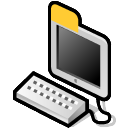-
Permanently Deleting File
From MIKE POWELL@VERT/CAPCITY2/CAPCITY to ALL on Sun Jul 10 21:27:00 2011A friend of mine that is running WinXP has asked me if there is a way to permanently delete a file from his system. He knows he can use Shift-Del
to make it look deleted, but he is asking how to completely remove files
from the system so that they can never be recovered (bank info, etc.).
I know of software that will completely wipe-out the entire HD, but I don't know of any that do so for individual files. IIRC, the old Norton Desktop (from WfWG 3.11 days) had a "Shredder" icon that supposedly did that.
Is there a method to permanently delete a file, rather than moving it to
the recycle bin or otherwise leaving some recoverable footprint on the HD?
Mike
---
■ BgNet 1.0ß12 ≈ Capitol City Online * KY/US * 502/875-8938 * cco.ath.cx
-
From Nightfox to MIKE POWELL on Mon Jul 11 12:34:29 2011
A friend of mine that is running WinXP has asked me if there is a way to permanently delete a file from his system. He knows he can use Shift-Del
to make it look deleted, but he is asking how to completely remove files from the system so that they can never be recovered (bank info, etc.).
I know of software that will completely wipe-out the entire HD, but I don't know of any that do so for individual files. IIRC, the old Norton Desktop (from WfWG 3.11 days) had a "Shredder" icon that supposedly did that.
Is there a method to permanently delete a file, rather than moving it to
the recycle bin or otherwise leaving some recoverable footprint on the HD?
It seems like you'd just need to have an application that would delete the
file and then write zeroes to the HD where the file was located, but offhand I don't know of an application that does that.
I've also heard that even after a hard drive is wiped out, there is still some residual magnetic information that can allow recovery of some data. I've
heard from some people that wiping out a hard drive 2 or 3 times can prevent some of that, so the same thing might need to be done on a per-file basis.
Nightfox
-
From Dreamer@VERT/SETXBBS to MIKE POWELL on Mon Jul 11 14:22:13 2011Re: Permanently Deleting File
By: MIKE POWELL to ALL on Sun Jul 10 2011 09:27 pm
A friend of mine that is running WinXP has asked me if there is a way to permanently delete a file from his system. He knows he can use Shift-Del
to make it look deleted, but he is asking how to completely remove files from the system so that they can never be recovered (bank info, etc.).
I know of software that will completely wipe-out the entire HD, but I don't know of any that do so for individual files. IIRC, the old Norton Desktop (from WfWG 3.11 days) had a "Shredder" icon that supposedly did that.
Is there a method to permanently delete a file, rather than moving it to
the recycle bin or otherwise leaving some recoverable footprint on the HD?
Google for file deletion utilities, or shredders. There are still some out there.
Be aware that if for some reason law enforcement has reason to confiscate and inspect the drive, if they're competent or contract outside, some information can still be retrieved forensicly. Of course, that's only for the really paranoid; I think they'd have to *really* want to find something.
---
■ Synchronet ■ Southeast Texas BBS -- setxbbs.synchro.net
-
From Dreamer@VERT/SETXBBS to Nightfox on Mon Jul 11 17:03:12 2011Re: Permanently Deleting File
By: Nightfox to MIKE POWELL on Mon Jul 11 2011 12:34 pm
It seems like you'd just need to have an application that would delete the file and then write zeroes to the HD where the file was located, but
offhand I don't know of an application that does that.
Oh, there's some that do way more than that. It zeroes, ones, zeroes, random writes, etc. The more writes the better; one or two simple writes doesn't hide all of the data; an expert can use special tools to read the field strength on the platter and reconstruct what data may have been there. This is what shredder tools are trying to defeat.
Then again, the simple writes will defeat the average joe from recovering data. When you delete a file in FAT, all that happens is the first character in the directory listing is changed to '?', and the sectors used are allocated as free space. I used to have an undelete tool in the old days that would show all deleted files; you would select the one you wanted, give it the first character of the filename, and hopefully none of the data within had been written over.
You don't find these now due to the high number of disk writes on newer OS's. Unless you recover your file immediately, it's almost certainly doomed. Hence the recycle bin.
And as for NTFS, I don't know much about how it deletes files, but it's probably unlinking. The data is there, but is no longer "linked" to a directory or any other object. No idea if there's "undelete" tools for NTFS.
So, hope that's a decent background on the subject. Simple shredders are easy to find. Personally, I'd just encrypt my files with a long alphanumeric password. With a 10+ character password, it can take quite a while to break, and I've nothing to hide anyway. If you have somehing to hide, then you go to multiple encryption schemes, thorough shredding, occasional full disk wipes, etc...
---
■ Synchronet ■ Southeast Texas BBS -- setxbbs.synchro.net
-
From Nightfox to Dreamer on Mon Jul 11 18:33:49 2011Re: Permanently Deleting File
By: Dreamer to Nightfox on Mon Jul 11 2011 17:03:12
Then again, the simple writes will defeat the average joe from recovering da When you delete a file in FAT, all that happens is the first character in th directory listing is changed to '?', and the sectors used are allocated as f space. I used to have an undelete tool in the old days that would show all deleted files; you would select the one you wanted, give it the first charac of the filename, and hopefully none of the data within had been written over
I remember that.. A long time ago, I used to have a Norton Undelete tool for DOS, and then Microsoft included an undelete tool in MS-DOS (starting with version 5.0, if I remember right). It was very useful.
You don't find these now due to the high number of disk writes on newer OS's Unless you recover your file immediately, it's almost certainly doomed. Hen the recycle bin.
I've been able to undelete files in Windows XP and 7, but that's true, it's hard to undelete a file unless you try to do it very soon after you delete it.
And as for NTFS, I don't know much about how it deletes files, but it's probably unlinking. The data is there, but is no longer "linked" to a directory or any other object. No idea if there's "undelete" tools for NTFS
There are - I've used some. One of the more popular ones is Recuva: http://www.piriform.com/recuva
Nightfox
-
From Mindless Automaton@VERT/ELDRITCH to MIKE POWELL on Mon Jul 11 13:30:18 2011On 07/10/2011 05:27 PM, MIKE POWELL wrote:
A friend of mine that is running WinXP has asked me if there is a way to permanently delete a file from his system. He knows he can use Shift-Del
to make it look deleted, but he is asking how to completely remove files
from the system so that they can never be recovered (bank info, etc.).
I know of software that will completely wipe-out the entire HD, but I don't know of any that do so for individual files. IIRC, the old Norton Desktop (from WfWG 3.11 days) had a "Shredder" icon that supposedly did that.
Is there a method to permanently delete a file, rather than moving it to
the recycle bin or otherwise leaving some recoverable footprint on the HD?
I think Spybot S&D comes with a File Shredder utility for geeting rid of
your porn.. I mean files.. :P
I never used it though. :o
-Mindless Automaton
---
■ Synchronet ■ Eldritch Clockwork BBS - eldritch.darktech.org
-
From Tracker1@VERT/TRN to Mindless Automaton on Sun Jul 31 03:56:35 2011On 7/11/2011 10:30 AM, Mindless Automaton wrote:
Is there a method to permanently delete a file, rather than moving it to
the recycle bin or otherwise leaving some recoverable footprint on the HD?
I think Spybot S&D comes with a File Shredder utility for geeting rid of your porn.. I mean files.. :P
I never used it though. :o
Not sure if I'd advise using such a thing on an SSD... it may nuke recovery from the file system, but the bytes are likely still on disk, because of wear leveling.
For SSD full drive, there are usually a full disk clear utility from the manufacturer you can use.
--
Michael J. Ryan - http://tracker1.info/
---
■ Synchronet ■ Roughneck BBS - telnet://roughneckbbs.com - www.roughneckbbs.com
-
From Tracker1@VERT/TRN to Dreamer on Sun Jul 31 03:59:00 2011On 7/11/2011 3:03 PM, Dreamer wrote:
And as for NTFS, I don't know much about how it deletes files, but it's probably unlinking. The data is there, but is no longer "linked" to a directory or any other object. No idea if there's "undelete" tools for NTFS.
There are undelete utilities for NTFS drives, best to install one right after you install the OS. The free/open-source utilities work fine for this, so don't buy one.
So, hope that's a decent background on the subject. Simple shredders are easy
to find. Personally, I'd just encrypt my files with a long alphanumeric password. With a 10+ character password, it can take quite a while to break, and I've nothing to hide anyway. If you have somehing to hide, then you go to
multiple encryption schemes, thorough shredding, occasional full disk wipes, etc...
truecrypt ftw
--
Michael J. Ryan - http://tracker1.info/
---
■ Synchronet ■ Roughneck BBS - telnet://roughneckbbs.com - www.roughneckbbs.com
 Web-based telnet client
Web-based telnet client
Other Links
What is a BBS?
Doors installed on this BBS
Digital Distortion Doors & Tools
Door stats
Trivia scores
Message networks
Terminal software
Emulated games
Synchronet archiver setup
Ready.gov anti-terrorist guidelines as of 2003
Other services
 Telnet
Telnet
 RLogin
RLogin
 IRC
IRC
 Email & news access
Email & news access
Feel free to send me an email.
BBS UPS stats
Who's Online
Recent Visitors
-
DarkRaven
Mon Aug 18 02:28:21 2025
from Arizona via HTTP -
Jamaica Joe
Sun Jul 13 17:39:10 2025
from Las Vegas, NV via HTTP -
Merlin
Mon Apr 14 06:31:48 2025
from Milton, WV via HTTP -
Merlin
Sun Apr 6 09:19:55 2025
from Milton, WV via HTTP
-
DarkRaven
System Info
Sysop: Eric Oulashin Location: Beaverton, Oregon, USA Users: 120 Nodes: 16 (0 / 16) Uptime: 06:16:58 Calls: 7,404 Calls today: 1 Files: 9,253 D/L today: 714 files
(109M bytes)Messages: 385,489